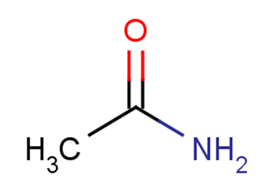
Acetamide
CAS No. 60-35-5
Acetamide( ethanamide | Acetic acid amide )
Catalog No. M20887 CAS No. 60-35-5
Acetamide is found in red beetrootis used primarily as a solvent and a plasticizer.
Purity : >98% (HPLC)
 COA
COA
 Datasheet
Datasheet
 HNMR
HNMR
 HPLC
HPLC
 MSDS
MSDS
 Handing Instructions
Handing Instructions
| Size | Price / USD | Stock | Quantity |
| 5MG | 49 | In Stock |


|
| 100MG | Get Quote | In Stock |


|
| 200MG | Get Quote | In Stock |


|
| 500MG | Get Quote | In Stock |


|
| 1G | Get Quote | In Stock |


|
Biological Information
-
Product NameAcetamide
-
NoteResearch use only, not for human use.
-
Brief DescriptionAcetamide is found in red beetrootis used primarily as a solvent and a plasticizer.
-
DescriptionAcetamide is found in red beetrootis used primarily as a solvent and a plasticizer.
-
In Vitro——
-
In Vivo——
-
Synonymsethanamide | Acetic acid amide
-
PathwayProteasome/Ubiquitin
-
TargetEndogenous Metabolite
-
RecptorHuman Endogenous Metabolite
-
Research Area——
-
Indication——
Chemical Information
-
CAS Number60-35-5
-
Formula Weight59.07
-
Molecular FormulaC2H5NO
-
Purity>98% (HPLC)
-
SolubilityDMSO:11 mg/mL (186.21 mM)
-
SMILESCC(N)=O
-
Chemical Name——
Shipping & Storage Information
-
Storage(-20℃)
-
ShippingWith Ice Pack
-
Stability≥ 2 years
Reference
1.Exposure Assessment of Acetamide in Milk Beef and Coffee Using Xanthydrol Derivatization and Gas Chromatography/Mass Spectrometry[J]. Journal of Agricultural and Food Chemistry 2018 66(1):298-305.
molnova catalog



related products
-
11(Z),14(Z),17(Z)-Ei...
11(Z),14(Z),17(Z)-Eicosatrienoic acid is an unsaturated fatty acid capable of maintaining continuous replication of functional mitochondria in Saccharomyces cerevisiae (KD115).
-
Nervonic acid
Nervonic acid is a long chain unsaturated fatty acid that is enriched in sphingomyelin. It consists of choline sphingosine phosphoric acid and fatty acid.
-
Anserine
Anserine is a dipeptide containing β-alanine and histidine, which can be found in the skeletal muscle and brain of mammals and birds.?



 Cart
Cart
 sales@molnova.com
sales@molnova.com


